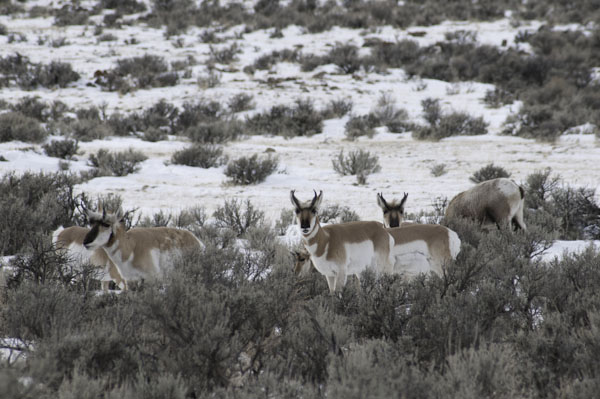sagebrush
-
An important question regarding sagebrush ecosystems, and species that rely upon them like sage grouse has to do with exactly what constitutes the fire rotation in sagebrush habitat? And a corrolary question is do current fire management policies emulate these historical conditions? William Baker’s paper, Scaling Landscape Fire History: Wildfires Not Historically Frequent in the…
-
Prime pygmy rabbit sagebrush habitat along the Big Lost River where I lived while working for the Challis National Forest. Photo George Wuerthner Years ago, I worked on the Challis National Forest and lived along the Big Lost River in Central Idaho. One of my favorite winter activities was skiing through the big sagebrush…
-
Livestock grazing in the Great Basin has increased cheatgrass, a highly flammable annual grass. Livestock advocates allege targeted grazing can reduce large wildfires. Photo George Wuerthner A recent publication in the Journal of Rangeland Ecology and Management, “Evaluating the efficacy of targeted cattle grazing for fuel break creation and maintenance,” perpetuates the myth that livestock…
-
No chance of fires here–remove all vegetation and your problem with wildfire is solved. Photo George Wuerthner A recent article in the Capitol Press titled: “New game plan: How targeted grazing on public lands is changing” describes how targeted grazing can fix any problems on public lands. Not unlike how logging is often described…
-
A high severity blaze on the Boise National Forest. Almost all large fires occur during extreme drought conditions. Photo George Wuerthner One continuously hears from the timber industry and its allies that the present occurrence of large wildfires is primarily the result of 100 years of “fire suppression” and thus “abnormal” fuel accumulations. We are…
-
Hardly a day goes by when we don’t hear in the media and from the Forest Service that fire suppression is responsible for the intensity and size of wildfires. According to proponents, a “hundred years of fire suppression” has permitted the build-up of fuels, and by their assertion, more fuel results in larger conflagrations. However,…
-
The Bighorn National Forest is one of the hidden gems of the West. With peaks towering to over 13,000 feet and spacious flower-studded meadows, the forest is an underappreciated scenic and wildlife haven of the West. The Cloud Peak Wilderness on the Bighorn National Forest is a lake-studded area of granite basins. Photo George Wuerthner …
-
A week ago, eight prominent scientists sent a letter to the Bureau of Land Management (BLM) declaring that the agency’s proposed Tri-State Fuel Break (TSFB) is flawed and will endanger sagebrush ecosystems. The Final Environmental Impact Statement (“FEIS”) and other project documents are available on the agency’s website at https://eplanning.blm.gov/eplanning-ui/project/42341/510. To quote the scientists: “If…
